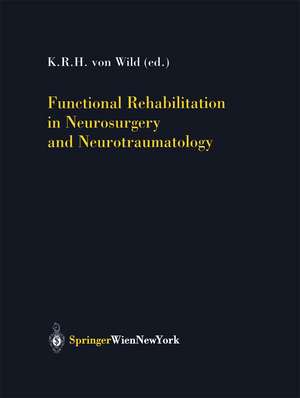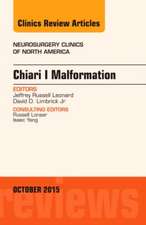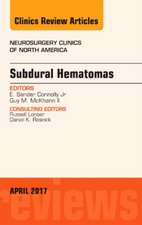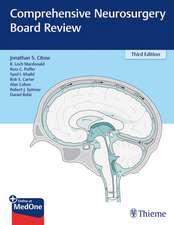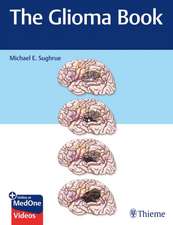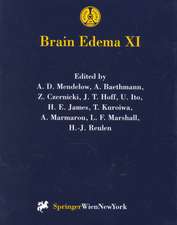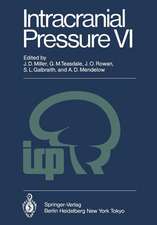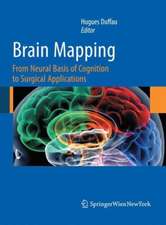Functional Rehabilitation in Neurosurgery and Neurotraumatology: Acta Neurochirurgica Supplement, cartea 79
M. Lipovsek Editat de K.R.H. von Wild A.D. Mendelow, J.-L. Truelleen Limba Engleză Paperback – 5 noi 2012
| Toate formatele și edițiile | Preț | Express |
|---|---|---|
| Paperback (1) | 1092.99 lei 6-8 săpt. | |
| SPRINGER VIENNA – 5 noi 2012 | 1092.99 lei 6-8 săpt. | |
| Hardback (1) | 995.04 lei 38-44 zile | |
| SPRINGER VIENNA – 6 mar 2002 | 995.04 lei 38-44 zile |
Din seria Acta Neurochirurgica Supplement
- 5%
 Preț: 1798.83 lei
Preț: 1798.83 lei - 5%
 Preț: 1445.88 lei
Preț: 1445.88 lei - 5%
 Preț: 1102.31 lei
Preț: 1102.31 lei - 5%
 Preț: 1136.85 lei
Preț: 1136.85 lei - 5%
 Preț: 811.16 lei
Preț: 811.16 lei - 5%
 Preț: 1112.70 lei
Preț: 1112.70 lei - 5%
 Preț: 529.81 lei
Preț: 529.81 lei - 5%
 Preț: 791.25 lei
Preț: 791.25 lei - 5%
 Preț: 1303.26 lei
Preț: 1303.26 lei - 5%
 Preț: 410.88 lei
Preț: 410.88 lei - 5%
 Preț: 345.71 lei
Preț: 345.71 lei - 5%
 Preț: 1316.08 lei
Preț: 1316.08 lei - 5%
 Preț: 1452.28 lei
Preț: 1452.28 lei - 5%
 Preț: 1348.49 lei
Preț: 1348.49 lei - 5%
 Preț: 370.94 lei
Preț: 370.94 lei - 5%
 Preț: 376.22 lei
Preț: 376.22 lei - 5%
 Preț: 715.00 lei
Preț: 715.00 lei - 5%
 Preț: 364.17 lei
Preț: 364.17 lei - 5%
 Preț: 365.82 lei
Preț: 365.82 lei - 5%
 Preț: 366.91 lei
Preț: 366.91 lei - 5%
 Preț: 384.08 lei
Preț: 384.08 lei - 5%
 Preț: 397.16 lei
Preț: 397.16 lei - 5%
 Preț: 367.64 lei
Preț: 367.64 lei - 5%
 Preț: 373.12 lei
Preț: 373.12 lei - 5%
 Preț: 993.13 lei
Preț: 993.13 lei - 5%
 Preț: 394.07 lei
Preț: 394.07 lei - 5%
 Preț: 364.74 lei
Preț: 364.74 lei - 5%
 Preț: 1095.90 lei
Preț: 1095.90 lei - 5%
 Preț: 1824.10 lei
Preț: 1824.10 lei - 5%
 Preț: 1119.31 lei
Preț: 1119.31 lei - 5%
 Preț: 1312.12 lei
Preț: 1312.12 lei - 5%
 Preț: 1119.68 lei
Preț: 1119.68 lei - 5%
 Preț: 1331.78 lei
Preț: 1331.78 lei - 5%
 Preț: 1430.72 lei
Preț: 1430.72 lei - 5%
 Preț: 1405.49 lei
Preț: 1405.49 lei - 5%
 Preț: 1418.48 lei
Preț: 1418.48 lei - 5%
 Preț: 392.25 lei
Preț: 392.25 lei - 5%
 Preț: 1335.46 lei
Preț: 1335.46 lei - 5%
 Preț: 1375.23 lei
Preț: 1375.23 lei
Preț: 1092.99 lei
Preț vechi: 1150.52 lei
-5% Nou
Puncte Express: 1639
Preț estimativ în valută:
209.21€ • 227.32$ • 175.85£
209.21€ • 227.32$ • 175.85£
Carte tipărită la comandă
Livrare economică 21 aprilie-05 mai
Preluare comenzi: 021 569.72.76
Specificații
ISBN-13: 9783709172834
ISBN-10: 3709172837
Pagini: 164
Ilustrații: X, 150 p.
Dimensiuni: 210 x 279 x 9 mm
Greutate: 0.39 kg
Ediția:Softcover reprint of the original 1st ed. 2002
Editura: SPRINGER VIENNA
Colecția Springer
Seria Acta Neurochirurgica Supplement
Locul publicării:Vienna, Austria
ISBN-10: 3709172837
Pagini: 164
Ilustrații: X, 150 p.
Dimensiuni: 210 x 279 x 9 mm
Greutate: 0.39 kg
Ediția:Softcover reprint of the original 1st ed. 2002
Editura: SPRINGER VIENNA
Colecția Springer
Seria Acta Neurochirurgica Supplement
Locul publicării:Vienna, Austria
Public țintă
ResearchCuprins
I: Neurosurgical Rehabilitation, Current Concepts, Strategies, and Outcome.- Neuro-Rehabilitation - a Challenge for Neurosurgeons in the 21st Century. Concepts and Visions of the WFNS Committee on Neurosurgical Rehabilitation.- Standards of Neurologic-Neurosurgical Early Rehabilitation.- Early Rehabilitative Concepts in Therapy of the Comatose Brain Injured Patients.- Incidence and Management of Complications During Posttraumatic Early Rehabilitation.- Early Functional Outcome in Isolated (TBI) and Combined Traumatic (CTBI) Brain Injury.- Neurological and Social Long-Term Outcome after Early Rehabilitation Following Traumatic Brain Injury, 5 Year-Report on 240 TBI Patients.- Requirements ofTeam Effectiveness in Neurosurgical Rehabilitation.- Merging Pathways: Music Therapy in Neurosurgical Rehabilitation.- The Impact of Treatment on Survival Roles of a Person with a Traumatic Brain Injury.- A Computerized Version of EBIS Evaluation Chart and its Opportunities in the Rehabilitation Program of TBI Patients.- Satisfaction of Life and Late Psycho-Social Outcome after Severe Brain Injury: A Nine-Year Follow up Study in Aquitaine.- Clin ical Efficacy of Stimulation Programs Aimed at Reversing Coma or Vegetative State Following Traumatic Brain Injury.- What is a Good Re-Entry Programme? What are the Key Questions? -J. Douglas Miller Memorial Lecture 59.- Health Management Technology for Complex Medical Conditions.- II: Functional Neurosurgery and Neuromodulation.- The Important Role of Pain in Neurorehabilitation. The Neurosurgeon’s Approach.- Combined Intrathecal Baclofen and Morphine Infusion for the Treatment of Spasticity Related Pain and Central Deafferentiation Pain.- The Punctuate Midline Myelotomy Concept for Visceral Cancer Pain Control Case Report and Review of theLiterature.- Deep Brain Stimulation Therapy for a Persi stent Vegetative State.- Deep Brain Stimulation of the Globus Pallidus Internus (GPI) for Torsion Dystonia A Report of two Cases.- Control of Post-Stroke Movement Disorders Using Chornic Motor Cortex Stimulation.- Vagus Nerve Stimulation for Epilepsy, Clini cal Efficacy or Programmed and Magnet Stimulation.- Computer Added Locomotion by Implanted Electrical Stimulation in Paraplegic Patients (SUAW).- Application of a Dual Channel Peroneal Nerve Stimul ation in a Patient with a “Central” Drop Foot.- Rehabil itation of Hearing and Communication Function in Neurofibromatosis Type 2.- Electrical Stimulation of the Sural Nerve Partially Compensate s Effects of Central Fatigue.- Management of Upper and Lower Limb Spacticity in Neuro-Rehabilitation.- Botulinum Toxin (DYSPORT) in Tension Type Headaches.- III: Extended Abstracts.- Does Intensive Rehabilitation Improve the Functional Outcome of Patients with Traumatic Brain Injury (TBI)? Cognitive Function Result of a Randomised Controlled Trial..- Post Traumatic Vegetative States: Cost of Care.- Psychotherapeutic Aspects on Early Neurorehabilitation in ICU.- Neuropsychological View on Early Neurorehabilitation - View from Denmark.- Neurorehabi1itation the Danish Concept.- Early Neurorehabi1itation - Neurosurgical View.- The TORNEO Project for Professional Reintegration of People with Acquired Brain Injury.- B.N.I., a New Tool for Rapid Evaluation of Higher Cerebral Functions of Traumatic Brain Injured Patients.- Z. S.de Boisgeheneuc.- Thoughts on Early Neuro Rehabilitation (ENR) in Germany and Own Experience.- Combating Brain Attack: Therapeutic Strategies for Patients with Subarachnoid or Intracerebral Haemorrhage of Grave Prognosis.- Neuropsychological Evaluation ofthe Patients with Unruptured Cerebral Aneurysms Combined with Asymptomatic Cerebral Infarction before and after Surgery.- Neurological Outcome after Decompressive Craniectomy (DC) in 39 Patients Suffering from Middle Cerebral Artery (MCA) Infarction.- Sequelae of Damage to Extra-Intracranial Arteries Following Head Injury.- Dorsal Column Stimulation for Arousal of Coma.- Patients with Prolonged Consciousness Disturbances and Brain Electrical Stimulation Therapy.- Vigilance Enhancing Effect of Botulinum Toxin A (BtxA) after Local Application in Vegetative Patients with Severe Spacticity Following Traumatic Brain Injury (TBI).- Post Traumatic Epilepsy and Two-Year MRI Follow-up of Head Trauma: A Prospective Study.- Characteristics of Emotional Personality Disturbances in Adolescents with Chronic Post-Traumatic Headaches (CPTH) after Mild Traumatic Brain Injury (MTBI).- Longterm Neuropsychological Outcome after Childhood Traumatic Brain Injury (TBI): Effects of Age at Injury.- Suicide Following Traumatic Brain Injury: A Population Study.- Attentional Complaints of Professionals are More Accurate than Patients’ and Relatives’ Complaints Following Severe Traumatic Brain Injury.- Divided Attention after Severe Diffuse Traumatic Brain Injury.- An Ecological Approach of a Dysexecutive Syndrome.- Quality of Life 2 to 6 Years after Severe Traumatic Brain Injury (TBI).- Author Index.- Index of Keywords.
Caracteristici
Will enable neurosurgeons to make the right decision at the right time within the broad spectrum of neurorehabilitation for a better outcome and quality of life of the patients
